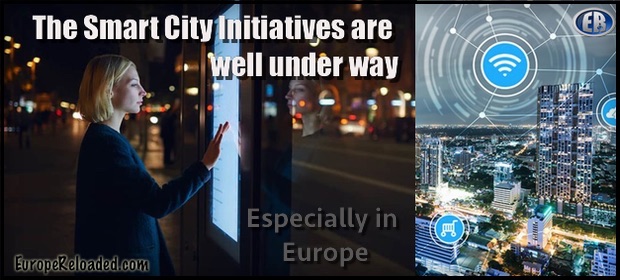
The Federal Government Is Promoting Sustainable Smart Cities
TECHNOCRACY NEWS
The author of this article works at HP, a leading Smart City technology provider. The US government is already heavily promoting Smart City technology and implementation from Opportunity Zones and regional governance to 5G wireless. ⁃ TN Editor
TOMMY GARDNER
While many of us might picture flying cars, bullet trains and billboards that recognize us as we pass by, most smart city technology will be far less flashy than depicted in popular culture. That doesn’t mean these urban areas will be any less exciting or life changing.
The reality? Most smart city initiatives are already underway and promote an important quality embedded within their design: sustainability.
Imagine yourself as a citizen of one of these smart cities. Traffic is flowing perfectly, driven by data, analytics and artificial intelligence (AI), thereby reducing your commute time to the office and the pollutants from idling cars at red lights.
Those traffic lights and your office could be regulated by similar systems, reducing the energy cost and the load on fossil fuel-burning power plants. In fact, why even commute at all when internet of things (IoT) infrastructure, enabling more devices to collaborate, makes working from home just as productive as the energy-burning office?
Sustainability and smart cities are as dynamic a duo as they are challenging. After all, a true smart city isn’t just about futuristic transportation solutions, it’s about smart infrastructure, healthcare, governance and more.
What role does the federal government play?
If our metropolitan areas don’t pick up the ball and run with it, other regions with more aggressive government initiatives will not only surpass the United States in developing this technology but they will also own what could be a $2.38 billion global market opportunity by 2025.
Europe is driving a concerted push to evolve smart cities, which is expected to grow thanks to its focus on climate and energy objectives. Emerging economies in Asia are also growing. There is an opportunity for the United States to step up and take the lead on smart cities, but we must move fast, before we are left behind.
If cities themselves manage much of the implementation and technology, where does the federal government come in?
For one thing: incentives.
Setting aside budget to supplement cities’ technological transformations is part of the motivating force the government can have. In doing so, it will also help encourage cities to take some risks rather than waiting for others to do it first.
Another key role of the federal government in smart city implementation comes down to people.
As citizens adapt to changing environments, the government has a responsibility to advocate for traditionally underserved populations, and to make sure the technology serves them, too. The same goes for rural communities. These parts of the country are going to be the first and also the hardest hit by climate change. Thus, they need to prepare now to evolve alongside their urban counterparts.
With the government’s help, impact is huge
Cities are responsible for an estimated 75% of greenhouse gas emissions. Seoul, South Korea, is the city responsible for the most carbon emissions globally, ahead of Guanghzou, China. But American cities, like New York and Los Angeles are among the top five offenders.
Given that the world’s population is expected to increase by an estimated 33% by 2050, with nearly 70% of people residing in urban centers, these statistics cannot be ignored.
It seems intuitive, then, that perhaps the most effective way to fight back against climate change is to make our largest contributor to climate change more efficient.
Many U.S. cities have committed to climate change programs led, in part, by the C40, a network of cities around the world committed to addressing climate change.
And we’re certainly seeing municipalities such as Atlanta, Austin, TX, Denver and San Francisco actively pursuing and promoting smart cities programs that involve sustainability goals. Gartner predicts that by 2020, half of all global smart city programs will include sustainability and climate change as key performance indicators (KPIs).
Knowing the environmental benefits exist and then programmatically pursuing technologies that will enable them is something the federal government can encourage and enable. Getting to the point where 100% of major U.S. cities and rural areas are marching toward the UN’s Sustainable Development Goals (SDGs) will involve a commitment to sustainability across all levels of government, in concert with business leaders and educators.
************
Original article

••••
The Liberty Beacon Project is now expanding at a near exponential rate, and for this we are grateful and excited! But we must also be practical. For 7 years we have not asked for any donations, and have built this project with our own funds as we grew. We are now experiencing ever increasing growing pains due to the large number of websites and projects we represent. So we have just installed donation buttons on our websites and ask that you consider this when you visit them. Nothing is too small. We thank you for all your support and your considerations … (TLB)
••••
Comment Policy: As a privately owned web site, we reserve the right to remove comments that contain spam, advertising, vulgarity, threats of violence, racism, or personal/abusive attacks on other users. This also applies to trolling, the use of more than one alias, or just intentional mischief. Enforcement of this policy is at the discretion of this websites administrators. Repeat offenders may be blocked or permanently banned without prior warning.
••••
Disclaimer: TLB websites contain copyrighted material the use of which has not always been specifically authorized by the copyright owner. We are making such material available to our readers under the provisions of “fair use” in an effort to advance a better understanding of political, health, economic and social issues. The material on this site is distributed without profit to those who have expressed a prior interest in receiving it for research and educational purposes. If you wish to use copyrighted material for purposes other than “fair use” you must request permission from the copyright owner.
••••
Disclaimer: The information and opinions shared are for informational purposes only including, but not limited to, text, graphics, images and other material are not intended as medical advice or instruction. Nothing mentioned is intended to be a substitute for professional medical advice, diagnosis or treatment.




